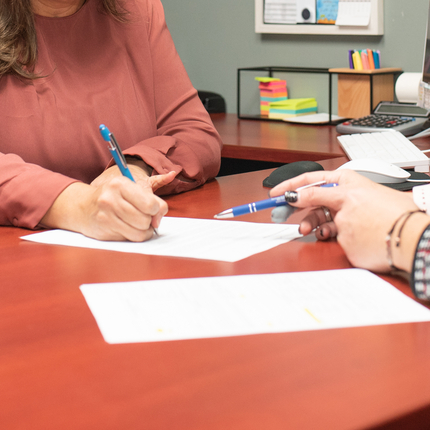Para la versión en español, oprima aquí.
As you set goals for your business, have you thought about access to capital and credit? Have you struggled year after year preparing for your tax appointment? Thinking about these items now will help you prepare for both the upcoming tax season and potential borrowing opportunities your business may need.
What should I bring to my tax preparation appointment?
Getting ready for your tax appointment can be stressful. Start early by collecting these items and making sure each is accessible.
- Last year’s tax return
- Current financial statements and bookkeeping records (journal entries, profit and loss statement, balance sheet)
- Income records—1099, W-2s for yourself/household and those paid to employees and/or contractors
- Estimated tax payments—state and federal taxes paid during the year
- General ledger—detailing each expense category for tax deductions
- List of depreciable assets
- Record of any benefits offered to employees
What business expenses should I share with my tax preparer?
Keeping a good record of your business expenses in your accounting software/program or in spreadsheets will be helpful to your preparer. Documentation of these expenses should include receipts or invoices. Business expenses that may be eligible for a tax deduction include:
- Meals and travel
- Advertising
- Legal/accounting fees
- Business insurance
- Office supplies, internet, cell phone
- Business loan interest
- Rent for equipment or business space
Your tax preparer may help identify other expenses. If you are a home-based business, you may deduct home office expenses such as square footage of the home or office space, proportion of your utilities, and in some cases a fraction of the property taxes and/or mortgage/rent.
You may also find deductions if you use your personal vehicle for business purposes. Keep a detailed record of your mileage and itemized receipts for fuel, repair, insurance, and lease payments.
Have you purchased or sold any assets in the past calendar year?
Your tax preparer will want to see invoices or receipts for large asset purchases. These items can be depreciated and reduce your tax liability over time. When you sell large assets, your tax preparer will want to see proof of the sale and remove it from your depreciation schedule.
Thinking about a loan for your small business in the future?
Preparing yourself with these tips will help equip you for a new loan opportunity. The more you have organized, the more likely you will be able to see a quick turnaround on your application. Even if you aren’t thinking about new loan capital now, it is better to be prepared for the potential emergency need for a cash injection or asset purchase.
Signs you are not ready for business credit
Lenders, like the Center for Rural Affairs and traditional banks, will struggle approving your application if:
- You have a business idea without a business plan—how can you turn your idea into a thriving business?
- You lack personal/business cash flow and/or struggle to make on-time payments.
- Your credit score is low or you don’t have a credit history—are there opportunities to build your personal credit score? Are there derogatory items to address?
- Your business isn’t registered or formally established—should you create an LLC, sole proprietorship, or incorporate?
- You do not separate business and personal banking accounts.
What will a lender look for?
- Business and personal tax returns
- Financial statements—balance sheet, profit and loss, income statement
- Bank statements (both personal and business)
- Business registration (state or federal employer identification number, or EIN)
- Business plan
The Center has created a checklist that may be useful as you prepare for your application. Click here for the checklist.
Good habits to start in 2023
- Maintaining good records of your business income and expenses.
- Keeping business and personal finances separated—business transactions should come from the business checking account or credit card, and personal transactions should come from your personal bank account. Keeping these separate accounts will also help you see the big picture as to where your money is going and help you address cash flow issues quickly. Your lender and your tax preparer will appreciate the organization as well.
- Take time to plan your 2023 goals, and find someone to help hold you accountable.
Do you own a small business and want free one-on-one counseling before your tax appointment? Click here to find your regional loan specialist.




